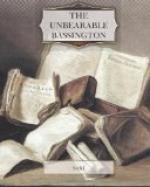His hopes and sympathies were notoriously on the Ministerial side.
Youghal greeted Lady Caroline and subsided gracefully into a chair well in the front of the box. A buzz of recognition rippled slowly across the house.
“For the Government to fall on a matter of conscience,” he said, “would be like a man cutting himself with a safety razor.”
Lady Caroline purred a gentle approval.
“I’m afraid it’s true, Archdeacon,” she said.
No one can effectively defend a Government when it’s been in office several years. The Archdeacon took refuge in light skirmishing.
“I believe Lady Caroline sees the makings of a great Socialist statesman in you, Youghal,” he observed.
“Great Socialist statesmen aren’t made, they’re stillborn,” replied Youghal.
“What is the play about to-night?” asked a pale young woman who had taken no part in the talk.
“I don’t know,” said Lady Caroline, “but I hope it’s dull. If there is any brilliant conversation in it I shall burst into tears.”
In the front row of the upper circle a woman with a restless starling-voice was discussing the work of a temporarily fashionable composer, chiefly in relation to her own emotions, which she seemed to think might prove generally interesting to those around her.
“Whenever I hear his music I feel that I want to go up into a mountain and pray. Can you understand that feeling?”
The girl to whom she was unburdening herself shook her head.
“You see, I’ve heard his music chiefly in Switzerland, and we were up among the mountains all the time, so it wouldn’t have made any difference.”
“In that case,” said the woman, who seemed to have emergency emotions to suit all geographical conditions, “I should have wanted to be in a great silent plain by the side of a rushing river.”
“What I think is so splendid about his music—” commenced another starling-voice on the further side of the girl. Like sheep that feed greedily before the coming of a storm the starling-voices seemed impelled to extra effort by the knowledge of four imminent intervals of acting during which they would be hushed into constrained silence.
In the back row of the dress circle a late-comer, after a cursory glance at the programme, had settled down into a comfortable narrative, which was evidently the resumed thread of an unfinished taxi-drive monologue.
“We all said ’it can’t be Captain Parminter, because he’s always been sweet on Joan,’ and then Emily said—”
The curtain went up, and Emily’s contribution to the discussion had to be held over till the entr’acte.
The play promised to be a success. The author, avoiding the pitfall of brilliancy, had aimed at being interesting and as far as possible, bearing in mind that his play was a comedy, he had striven to be amusing. Above all he had remembered that in the laws of stage proportions it is permissible and generally desirable that the part should be greater than the whole; hence he had been careful to give the leading lady such a clear and commanding lead over the other characters of the play that it was impossible for any of them ever to get on level terms with her. The action of the piece was now and then delayed thereby, but the duration of its run would be materially prolonged.




